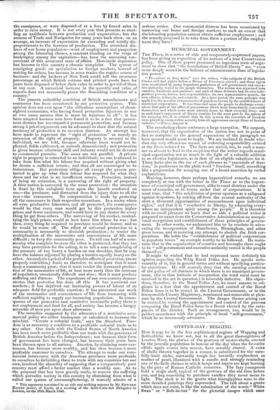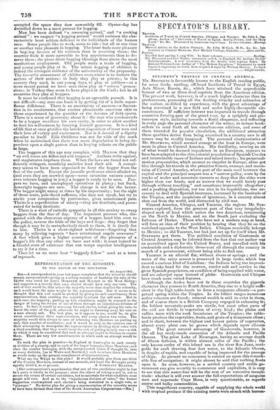OYSTER-DAY: BEGGING. occupied the space they tiow unworthily fill. Oyster-day
has dwindled down to a mere pretext for begging. Man has been defined "a reasoning animal," and "a cooking animal" : we suspect "a begging animal" would embrace the cha- racteristic least seldom deficient in the individuals of the human race. Some people like to work, some to idle ; but all at one time or another take pleasure in begging. The lover finds more pleasure in beg2ing favours of his mistress than in receiving them ; the Courtier finds it more agreeable to beg appointments than to de- serve them ; the pious deem begging blessings from above the most Meritorious employment. Old people make a trade of begging, and young people play at it. The mimic begging of children is indeed the strongest evidence of the universality of the propensity. The favourite amusement of children everywhere is to imitate the actions of their seniors : in Italy they play at priests ; in this country they used, in our young days, to play at soldiers—at a more recent period we have seen them play at " reform " proces- sions; in Turkey they seem to have played at the Cadi ; but in all countries they play at beggars. It must be confessed that begging is an agreeable pursuit. It is not difficult—any man can learn it by getting rid of a little super- fluous diffidence. There is an uncertainty of success—a fluctua- tion in its emoluments, that excites pleasurable emotions akin to those experienced by the gambler or the devotee of field-sports. There is a sense of generosity about it : the man who condescends to be a beggar sacrifices his own vanity, in order to allow another to feed his self-esteem by fancying himself generous. It is a kind oflife that at once gratifies the indolent disposition of most men and their love of variety and excitement. Nor is it devoid of a dignity peculiar to itself. Edie Ochiltree was not far wide of the mark when he maintained that there was more degradation in being de- pendent upon a single patron than in levying tribute on the public at large. The beggars of this age may complain with MILTON that they " on evil times are fallen and evil tongues." Authors write against, and magistrates imprison them. When the laws are found not suf- ficiently stringent, mendiciry societies lend their aid. A conspi- racy seems to have been organized to hunt the beggar from the face of the earth. Except the juvenile professors above alluded to, (and even they are scowled upon—some saturnine natures cannot even tolerate begging in jest,) a beggar is rarely to be seen. Pau- pers we have, and unemployed operatives in plenty ; but frank, downright beggars are rare. The change is not for the better. The beggar might annoy at times by his importunity ; but the sight of those mute, pale-faced sufferers, who dare not speak, but try to excite your compassion by pantomime, gives unredeemed pain. Theirs is a superfetation of misery—they are destitute, and perse- cuted for being destitute.
There is a want of catholic sympathy in all this anxiety to sweep beggars from the face of day. The impatient persons who, dis- gusted with the clamorous urgency of a beggar, hand him over to the police, reverse the fable of the boys and frogs : they forget that though it may be (a metaphorical) death to them, it is (real) fun to him. Theirs is a short-sighted selfishness—forgetting that many by relieving vagrants " have entertained angels unawares." A fact which gives a higher conception of the pleasures of a beggar's life than any other we have met with : it must indeed be a blissful state of existence that can tempt superior intelligences to try it for a time.
Then let us no more hear " beggarly fellow" used as a term of reproach.



























 Previous page
Previous page